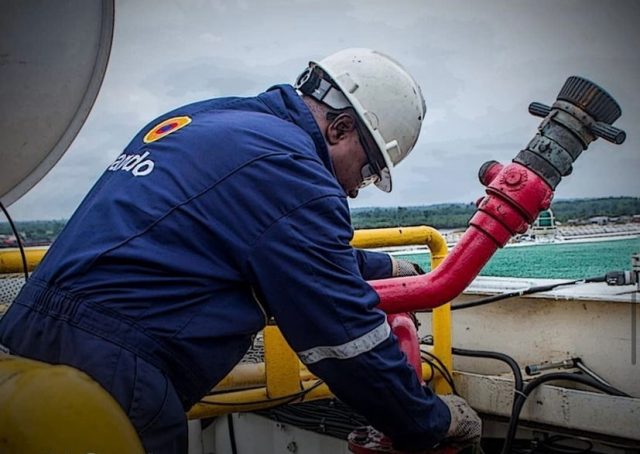WED, 22 JUNE, 2022-theGBJournal| Oando Plc, Nigeria’s leading indigenous energy group listed on both Nigerian Exchange Limited and Johannesburg Stock Exchange, today announced its audited financial statements for the year ended December 31, 2019, reporting 15% decline in turnover-N576.6 billion compared to N679.5 billion (FYE 2018).
The Group said the 15% decline in turnover was driven by a 10% decline in its average realized oil price in 2019 ($62.59 per barrel compared to $69.44 per barrel in 2018).
It reported operating loss of N334.9 billion in 2019, driven primarily by asset impairments totaling N316.7 billion.
Loss-After-Tax was reported at N207.1 billion compared to Profit-After-Tax of N28.8 billion (FYE 2018). The Loss-After-Tax was driven primarily by the above asset impairments of N316.7 billion, partially offset by an income tax credit of N170.3 billion.
Total Borrowings increased by 72% to N362.2 billion (compared to N210.9 billion in FYE 2018) due to the financing of the resolution of the protracted shareholder dispute.
Other upstream products also recorded declines in average realized price compared to 2018 (Natural Gas -13%; NGL -25%).
In the downstream, it recorded a 39% decline in traded volumes on refined products.
In FYE 2019, Oando Trading traded approximately 14 million barrels of crude oil under various contracts with the Nigerian National Petroleum Corporation (NNPC) and delivered 452,919 MT of refined products.
At the upstream, production increased by 6% to 42,492boe/day, compared with 40,023boe/day over the same period of 2018. A breakdown of the 2019 production consisted of 17,969 bbls/day of crude oil, 2,476 boe/day of NGLs and 132,281 mcf/day (22,047 boe/day) of natural gas.
Over the course of the year, in conjunction with its JV partners, it aggressively ramped up its drilling program towards increasing oil revenue and meeting gas obligations. In July 2019, it successfully completed a side-track at OML 56, shoring up net production by ~1,500bbls/day, whilst also drilling and completing five wells across three rig lines at its joint venture operations on OMLs 60-63 during the year.
In September 2019, the NAOC/ OOL/ NPDC JV (of which Oando Energy Resources [OER] holds a 20% working interest through its subsidiary OOL) announced that it had made a significant gas and condensate find in the deeper sequences of the Obiafu-Obrikom fields in OML 61, onshore Niger Delta, amounting to about 1 trillion cubic feet of gas and 60 million barrels of associated condensate.
The well has the capacity to deliver more than 100 million standard cubic feet/day of gas and 3,000 barrels/day of associated condensates. The discovery is part of a drilling campaign planned by the Joint Venture aimed at exploring near-field and deep pool opportunities as immediate time to market opportunities. OER is positive that this discovery will have an impact on its gas reserves.
Capital expenditure of $78.8 million was incurred in the 2019 financial year compared to $104.9 million in same period in 2018, representing a 25% decrease. Approximately 91% of 2019 Capital expenditure was allocated to OMLs 60-63 ($71.3 million) towards the development of oil and gas assets, as well as exploration and evaluation activities. $6.3 million was spent on OML 56 towards development drilling and capital construction. $1.2 million was spent largely on capital construction, as well as to advance exploration on the other assets.
Wale Tinubu, Group Chief Executive, Oando PLC said, “2019 witnessed the completion of our corporate strategy of divesting from our naira earning businesses to focus on a dollar-earning portfolio following the sale of our 25% residual stake in Axxela to Helios Investment Partners. This guarantees that future income is protected from foreign exchange fluctuations which have hindered us in the past.’’
Tinubu noted that the COVID-19 pandemic, despite surfacing at the tail end of 2019, had major repercussions on financial reporting across the globe with the oil industry recording over $145 billion in write-downs due to the impact of the pandemic on future cash flows, and consequently, the valuation of oil and gas assets.
‘’We were no exception as following a thorough evaluation of our oil and gas assets, we had to book non-financial impairments of N169 billion during the year in line with IFRS reporting guidelines. In addition, following the successful resolution of a longstanding, and value destructive shareholder dispute that had plagued the company since 2017, we had to recognize a significant impairment of N148 billion on the financial assets arising from the financing and settlement of the resolution.’’
Twitter-@theGBJournal| Facebook-The Government and Business Journal|email: gbj@govbusinessjournal.ng|govandbusinessj@gmail.com










